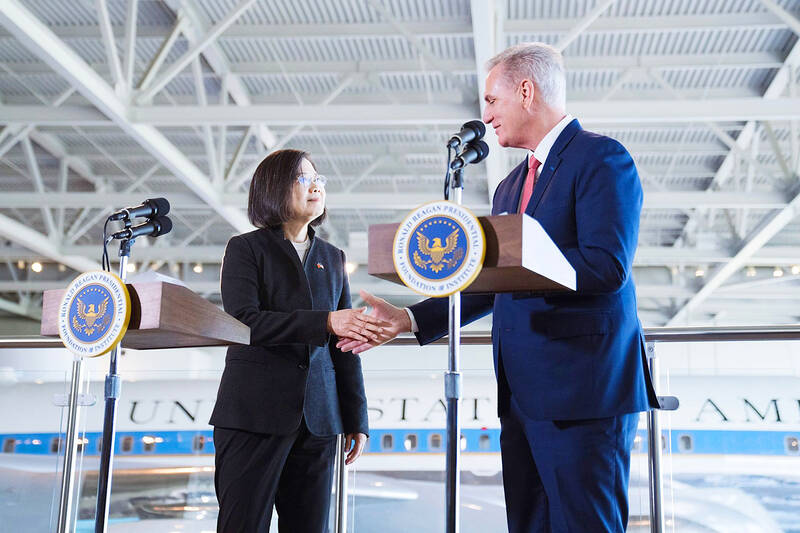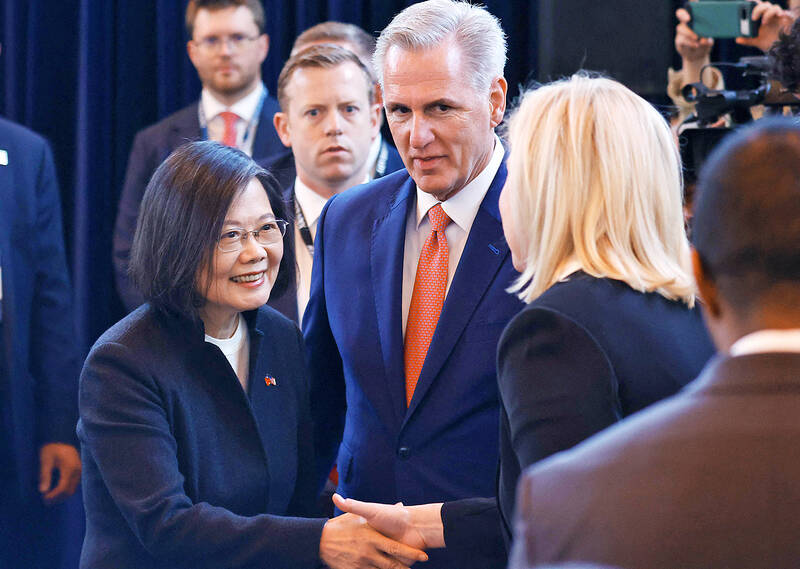President Tsai Ing-wen (蔡英文) and US House of Representatives Speaker Kevin McCarthy reaffirmed the strong partnership between Taiwan and the US, and their commitment to safeguarding regional stability, following their meeting in California on Wednesday.
“I believe our bond is stronger now than at any time or point in my lifetime,” McCarthy told a joint news conference with Tsai following a two-hour closed-door meeting at the Ronald Reagan Presidential Library in Simi Valley.
The meeting was also attended by a bipartisan group of US lawmakers. It was the first meeting between a Taiwanese president and a US House speaker on US soil, and the third since Washington severed formal diplomatic ties with Taipei in 1979.

Photo: Bloomberg
“Taiwan is a successful democracy, a thriving economy, and a global leader in health and science. And whether it’s our deep commercial ties, strong people-to-people relationships, or shared values, our cooperation with the people of Taiwan continue to expand through dialogue and exchange,” McCarthy said.
He said the friendship between Taiwanese and Americans “is a matter of profound importance to the free world,” and is critical to maintaining economic freedom, peace and regional stability.
Touting Wednesday’s meeting as a “bipartisan meeting of Republicans and Democrats united together,” McCarthy said the US would honor its obligations and commitment to its shared values with Taiwan.

Photo: AFP
Tsai told the news conference that the presence of bipartisan lawmakers at the meeting and their unwavering support reassures Taiwanese that “we are not isolated, and we are not alone.”
Taiwan’s peace and democracy, which it has worked hard to build and maintain, are facing “unprecedented challenges,” Tsai said.
“We once again find ourselves in a world where democracy is under threat. And the urgency of keeping the beacon of freedom shining cannot be understated,” she said.

Photo: AFP
Tsai said that during her meeting with US congressional leaders, she reiterated Taiwan’s commitment to defending the “peaceful status quo” and highlighted the belief championed by former US president Ronald Reagan that “to preserve peace, we must be strong.”
“We are stronger when we are together,” she said.
She thanked US lawmakers for proposing initiatives to enhance Taiwan’s self-defense capabilities, foster robust trade and economic ties between Taiwan and the US, and support the nation’s meaningful participation in the international community.

Photo: AFP
Tsai also paid tribute to Reagan, who she said played a crucial role in protecting and fortifying Taiwan-US relations at a time of changing diplomatic realities.
The Reagan administration’s “six assurances,” passed in 1982, as well as the landmark Taiwan Relations Act, laid the foundation for a strong and unique partnership that has lasted for more than four decades, during which Taiwan enjoyed peace, prosperity and democracy, Tsai said.
Wednesday’s meeting took place eight months after McCarthy’s predecessor, then-US House speaker Nancy Pelosi, visited Taipei in August last year and met with Tsai at the Presidential Office.
Pelosi’s visit was the first by a sitting US House speaker since a trip by Newt Gingrich in 1997. It prompted China to launch week-long large-scale military drills around Taiwan, and suspend the imports of dozens of Taiwanese agricultural and food products.
Beijing has raised objections to the meeting between Tsai and McCarthy.
Chinese Ministry of Foreign Affairs spokeswoman Mao Ning (毛寧) earlier this week told a news briefing that Beijing would “take resolute measures” to protect its national interests should the two meet.

The CIA has a message for Chinese government officials worried about their place in Chinese President Xi Jinping’s (習近平) government: Come work with us. The agency released two Mandarin-language videos on social media on Thursday inviting disgruntled officials to contact the CIA. The recruitment videos posted on YouTube and X racked up more than 5 million views combined in their first day. The outreach comes as CIA Director John Ratcliffe has vowed to boost the agency’s use of intelligence from human sources and its focus on China, which has recently targeted US officials with its own espionage operations. The videos are “aimed at

STEADFAST FRIEND: The bills encourage increased Taiwan-US engagement and address China’s distortion of UN Resolution 2758 to isolate Taiwan internationally The Presidential Office yesterday thanked the US House of Representatives for unanimously passing two Taiwan-related bills highlighting its solid support for Taiwan’s democracy and global participation, and for deepening bilateral relations. One of the bills, the Taiwan Assurance Implementation Act, requires the US Department of State to periodically review its guidelines for engagement with Taiwan, and report to the US Congress on the guidelines and plans to lift self-imposed limitations on US-Taiwan engagement. The other bill is the Taiwan International Solidarity Act, which clarifies that UN Resolution 2758 does not address the issue of the representation of Taiwan or its people in

US Indo-Pacific Commander Admiral Samuel Paparo on Friday expressed concern over the rate at which China is diversifying its military exercises, the Financial Times (FT) reported on Saturday. “The rates of change on the depth and breadth of their exercises is the one non-linear effect that I’ve seen in the last year that wakes me up at night or keeps me up at night,” Paparo was quoted by FT as saying while attending the annual Sedona Forum at the McCain Institute in Arizona. Paparo also expressed concern over the speed with which China was expanding its military. While the US

SHIFT: Taiwan’s better-than-expected first-quarter GDP and signs of weakness in the US have driven global capital back to emerging markets, the central bank head said The central bank yesterday blamed market speculation for the steep rise in the local currency, and urged exporters and financial institutions to stay calm and stop panic sell-offs to avoid hurting their own profitability. The nation’s top monetary policymaker said that it would step in, if necessary, to maintain order and stability in the foreign exchange market. The remarks came as the NT dollar yesterday closed up NT$0.919 to NT$30.145 against the US dollar in Taipei trading, after rising as high as NT$29.59 in intraday trading. The local currency has surged 5.85 percent against the greenback over the past two sessions, central